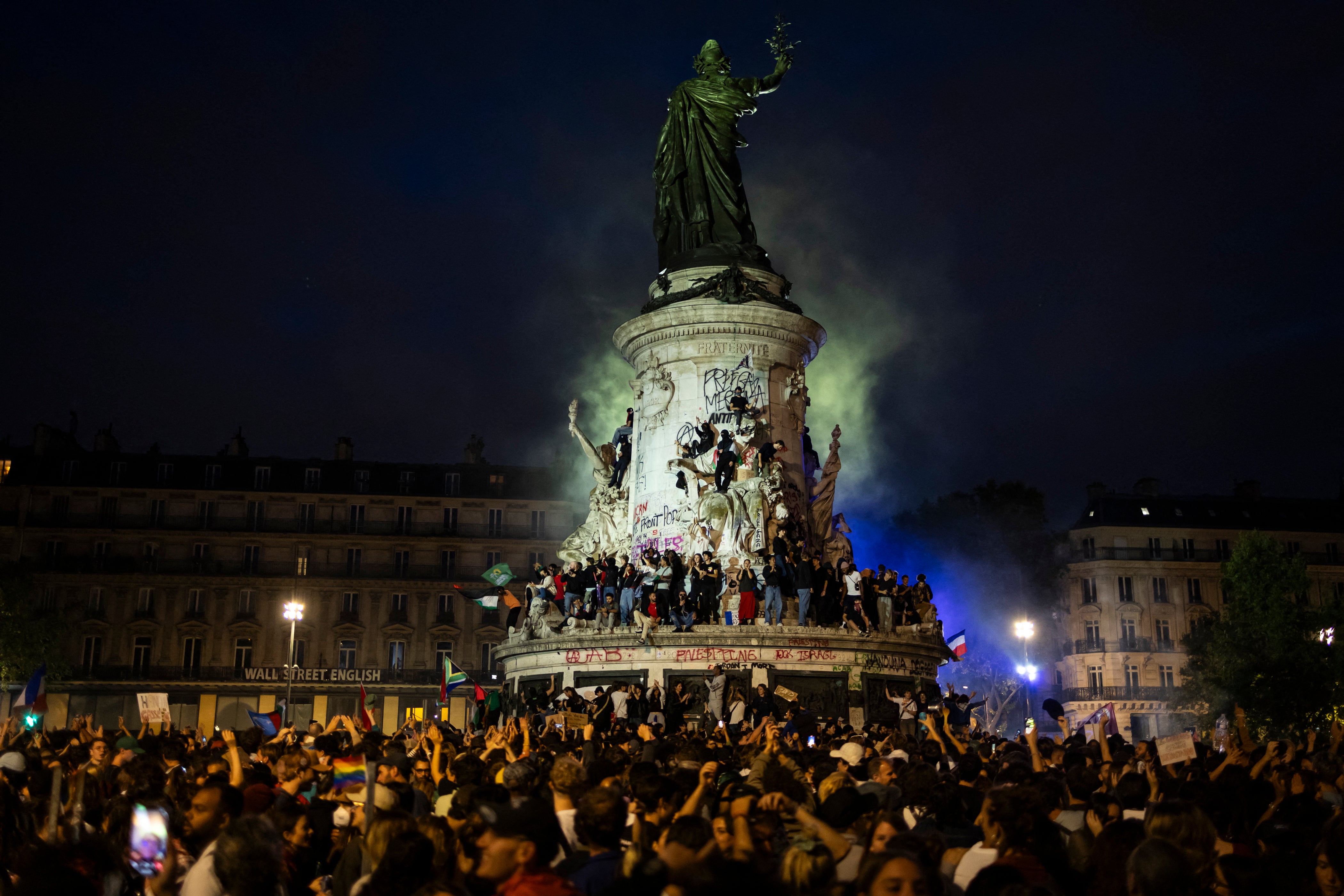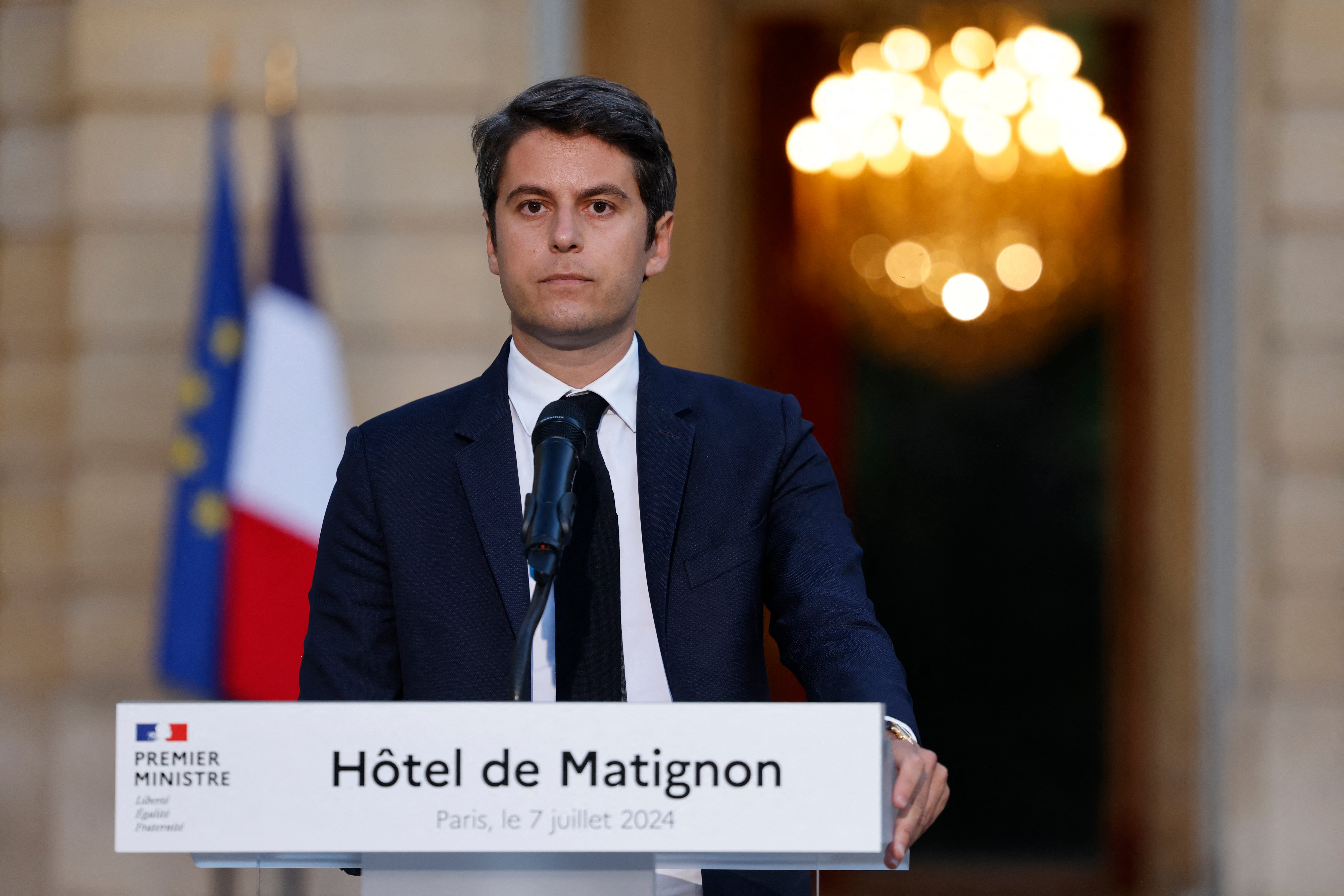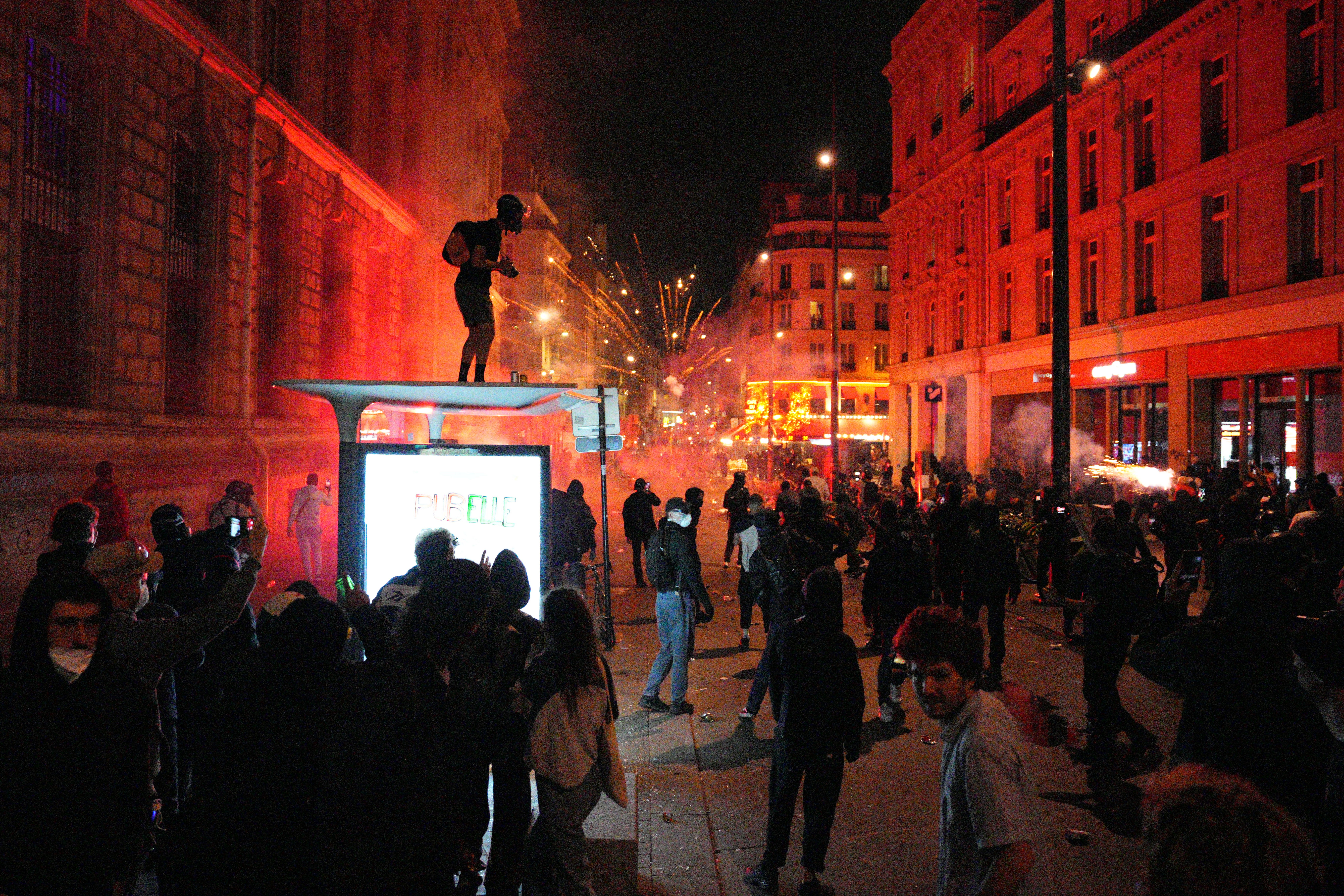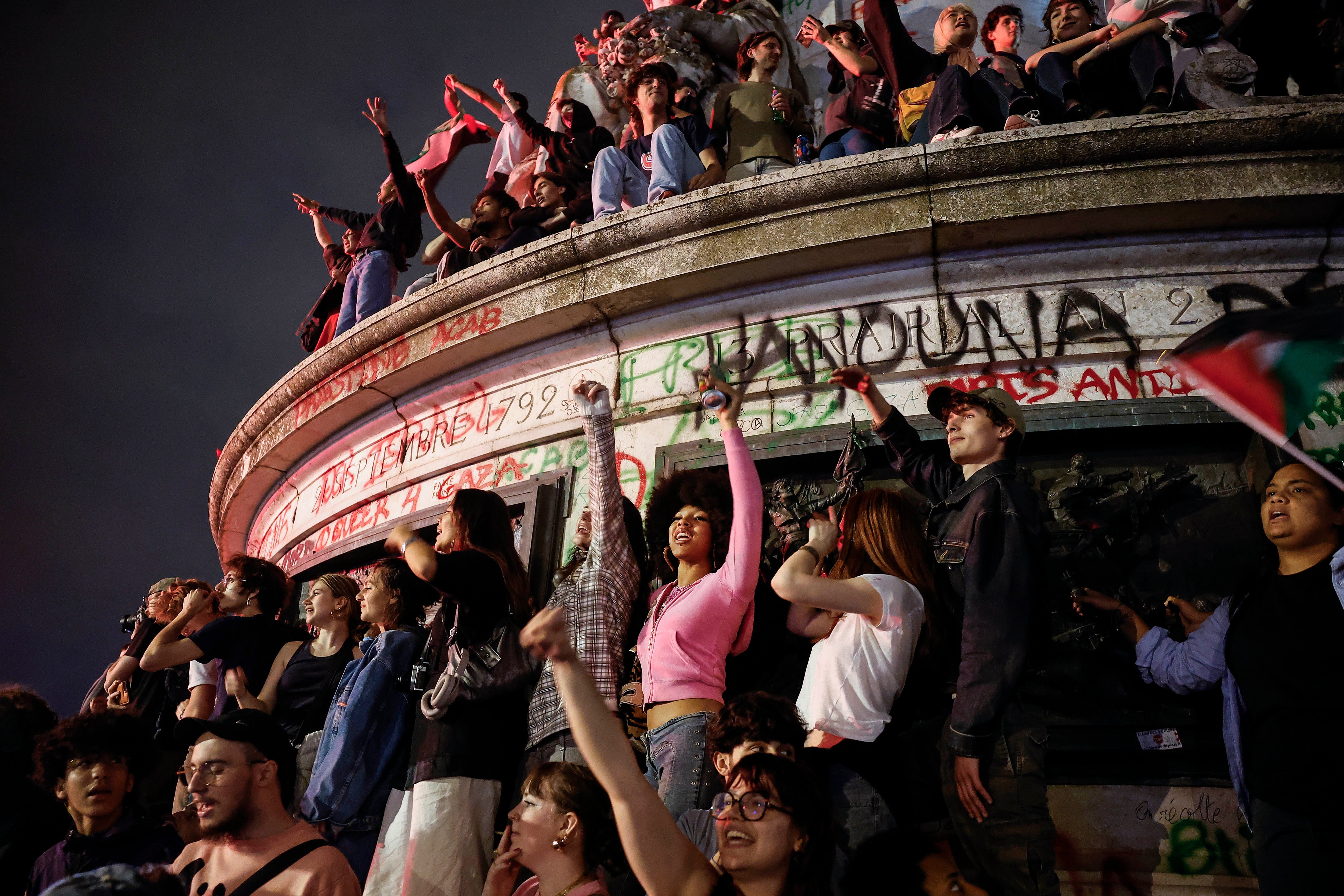France elections latest: Macron asks PM Attal to stay on as country faces ‘3 major risks’ over deadlock
France faces months of instability after none of the three major parties were able to achieve a majority at the second round of elections
French president Emmanuel Macron has refused the resignation of the country’s prime minister Gabriel Attal, asking him to stay on as the country faces weeks of political instability after a shock snap election result.
A left-wing alliance called New Popular Front won the most seats, with Mr Macron’s centrist grouping coming second. That pushed Marine Le Pen’s far-right National Rally (RN) into third, but with no party holding a majority. Le Pen’s party won the first round of the election late last month, but tactical voting – with more than 200 candidates, mostly from the left-wing alliance and the centrists, dropping out so as not to split the anti-RN vote.
Mr Attal had offered his resignation in the wake of the result, but Mr Macron has said he needs to stay on for now “to ensure the stability of the country” as the deal-making begins.
It comes as France's economic minister, Bruno Le Maire, faced three major risks over the political deadlock. He said the immediate risk was a "financial crisis and economic decline". The other two are an "ideological fracture of the nation” and a parliament full of “scattered” ideas from sides all with different agendas.
French newspaper runs front page of Bardella titled: ‘The slap'
Business newspaper Les Echos has run a front page showing a grim-faced Jordan Bardella with the headline “la claque” – which translates to “the slap”.
Bardella accuses Macron of ‘trying to paralyse our institutions'
Here is more from National Rally leader Jordan Bardella’s speech after his distant hopes of becoming prime minister became even more so with Sunday’s exit poll projections:
“I say tonight with gravity that depriving millions of French people of the possibility of seeing their ideas brought to power will never be a viable destiny for France.
“Tonight, by deliberately trying to paralyse our institutions, Emmanuel Macron has not simply pushed the country towards uncertainty and instability, he has deprived the French people of any response to their day-to-day difficulties for many months to come.
“In the midst of a purchasing power crisis, with insecurity and disorder hitting the country hard, France is deprived of a majority, of a government to act, and therefore of a clear course to turn France around.”
Watch: Celebrations in Paris as far-right projected to come third in exit poll
Hung parliament sees France heading into unknown territory
A hung parliament is unknown territory for modern France.
Unlike other countries in Europe that are more accustomed to coalition governments, France doesn’t have a tradition of politicians from rival political camps coming together to form a majority. France is also more centralised than many other European countries, with many more decisions made in Paris.
The president was hoping that with France’s fate in their hands, voters might shift from the far right and left and return to mainstream parties closer to the centre – where Emmanuel Macron found much of the support that won him the presidency in 2017 and again in 2022.
But rather than rally behind him, millions of voters seized on his surprise decision as an opportunity to vent their anger.
Pollsters see leftist alliance first with up to 198 seats
France faced potential political deadlock after elections yesterday threw up a hung parliament, with a leftist alliance unexpectedly taking the top spot but no group winning a majority.
Voters delivered a major setback for Marine Le Pen’s nationalist, eurosceptic National Rally (RN), which opinion polls had predicted would win the second-round ballot but ended up in the third spot, according to pollsters’ projections.
The results were also a blow for centrist president Emmanuel Macron, who called the snap election to clarify the political landscape after his ticket took a battering at the hands of the RN in European Parliament elections last month.
He ended up with a hugely fragmented parliament, in what is set to weaken France’s role in the European Union and elsewhere abroad and make it hard for anyone to push through a domestic agenda.
The election will leave parliament divided in three big groups - the left, centrists, and the far right - with hugely different platforms and no tradition at all of working together.
Poll promises of New Popular Front alliance
The leftist New Popular Front (NFP) alliance, which wants to cap prices of essential goods like fuel and food, raise the minimum wage to a net €1,600 ($1,732) per month, hike wages for public sector workers and impose a wealth tax, immediately said it wanted to govern.
“The will of the people must be strictly respected ... the president must invite the New Popular Front to govern,” said hard-left leader Jean-Luc Melenchon.
The eurosceptic National Rally (RN) has worked under Marine Le Pen to shed a historic reputation for racism and antisemitism but many in French society still view its France-first stance and surging popularity with alarm.

There were hugs, screams of joy and tears of relief at the left’s gathering in Paris when the voting projections were announced.
Republique square in central Paris filled with crowds and a party atmosphere, with leftwing supporters playing drums, lighting flares, and chanting “We’ve won! We’ve won!”
I’m relieved. As a French-Moroccan, a doctor, an ecologist activist, what the far right was proposing to do as a government was craziness.
The awkward leftist alliance, which the hard left, Greens and Socialists hastily put together before the vote, was far from having an absolute majority of 289 seats in the 577-seat assembly.
Official results were trickling in, with the results from most, if not all, constituencies likely in this morning.
Prime minister to resign today
Prime minister Gabriel Attal said he would hand in his resignation today but would stay on in a care-taking capacity as long as needed.
It comes as polling agencies forecast the left would get 184-198 seats, Emmanuel Macron’s centrist alliance 160-169 and the RN and its allies 135-143.
The euro fell yesterday after the vote projections were announced.
“We should get a brief respite in the market ... because we’re not seeing an extremist RN majority take place, but it’s likely to lead to political gridlock at least until the autumn of 2025,” said Aneeka Gupta, macroeconomic research director at WisdomTree.
Prime minister expresses disapproval of Macron's decision to call snap election
With the Paris Olympics looming, prime minister Gabriel Attal said he was ready to stay at his post “as long as duty demands”.
President Emmanuel Macron has three years remaining on his presidential term.
Mr Attal made clearer than ever his disapproval of Mr Macron’s shock decision to call the election, saying “I didn’t choose this dissolution” of the outgoing National Assembly, where the president’s centrist alliance used to be single biggest group, albeit without an absolute majority.

Still, it was able to govern for two years, pulling in lawmakers from other camps to fight off efforts to bring it down.
The new legislature appears shorn of such stability.
When Mr Macron flies to Washington for a summit this week of the Nato alliance, he will leave a country with no clear idea who may be its next prime minister and facing the prospect that the president may be obliged to share power with a politician deeply opposed to his policies.
What are the key challenges facing the leftist alliance?
A key question is whether the leftist alliance will stay united and agree on what course to take.
Jean-Luc Melenchon, leader of the hard-left France Unbowed, ruled out a broad coalition of parties of different stripes.
Raphael Glucksmann, from the Socialist Party, urged his alliance partners to act like “grown-ups”.
“We’re ahead, but we’re in a divided parliament,” he said. “We’re going to have to talk, to discuss, to engage in dialogue.”
The constitution does not oblige Emmanuel Macron to ask the leftist group to form a government, though that would be the usual step as it is the biggest group in parliament.

In Mr Macron’s entourage, there was no indication of his next move.
“The question we’re going to have to ask ourselves tonight and in the coming days is: which coalition is capable of reaching the 289 seats to govern?” one person close to him told Reuters.
Some in his alliance, including former prime minister Edouard Philippe, envisaged a broad cross-party alliance but said it could not include the far-left France Unbowed.
Left supporters rejoice after poll predictions
In Stalingrad Square, Paris, supporters on the left coalition cheered as projections showing the alliance in first place flashed on a giant screen. Cries of joy also rang out in Republique Plaza in eastern Paris, with people spontaneously hugging strangers and breaking into several minutes of nonstop applause after the projections landed.

Marielle Castry, a medical secretary, was on the Metro in Paris when the projected results were first announced.
“Everybody had their smartphones and were waiting for the results and then everybody was overjoyed,” said the 55-year-old. “I had been stressed out since 9 June and the European elections. And now, I feel good. Relieved.”
Join our commenting forum
Join thought-provoking conversations, follow other Independent readers and see their replies
Comments


Bookmark popover
Removed from bookmarks